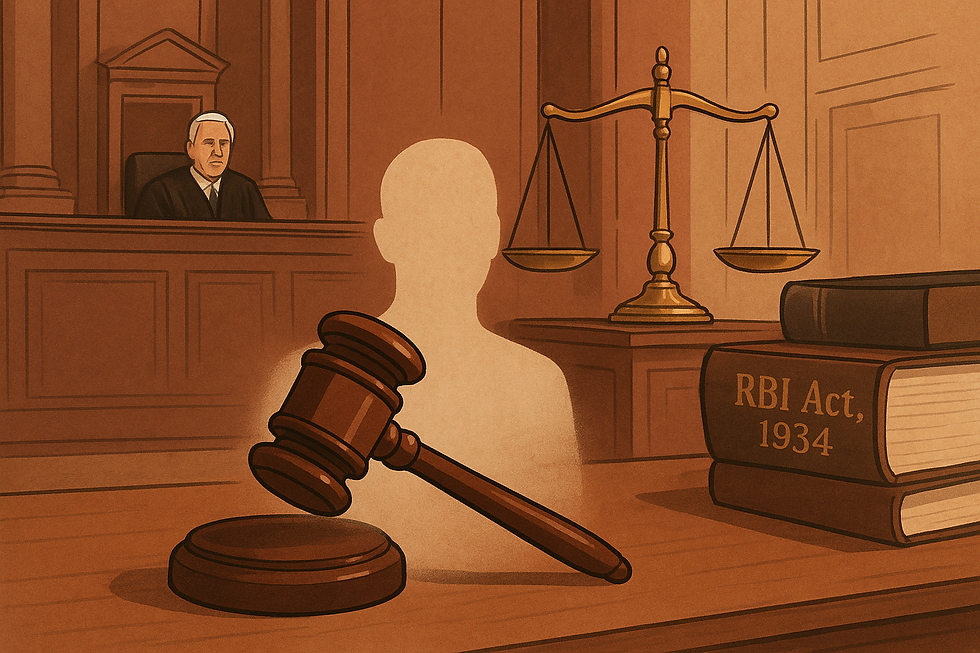The case dies upon the death of an accused – Telangana High Court.
- Lawttorney.ai

- Sep 7, 2025
- 3 min read
Case Title: Margadarsi Financiers And AnR v. State Of Andhra Pradesh, Rep. By Its Authorised Officer.
Introduction:
The Telangana High Court repeated the principle of criminal law that criminal liability is personal and depends on individuals and does not survive the death of an accused.
As criminal liabilities do not transfer to legal heirs or family members, the case against them must abate if the accused dies during the pendency of the criminal proceedings, held by a bench consisting of Justice P. Sam Koshy and Justice K. Sujana.

Background of the case:
The criminal petition was filed under section 482 of the CrPC (Now Section 528 of Bharatiya Nagarik Suraksha Sanhita, 2023), dismissing the complaint under sections 45S(1)(i) and 45S(1)(ii) read with section 58B of The Reserve Bank of India Act, 1934.
It was claimed that, in violation of section 45S of the RBI Act, the petitioners had illegally received deposits from the public. The deposit liability was around Rs. 5.33 crores held in an impound account with the Union Bank of India.
C. H. Ramoji Rao, the accused, has performed misconduct and violation under the RBI Act, 1934, as he is the Karta of a Hindu Undivided Family (HUF) and sole owner of the business.
The question raised before the Court:
The peak issue was:
Whether the criminal proceedings continue after the death of the accused, especially when he/she is the karta of the HUF and the sole owner of the business?
Court’s Inspection:
1. An individual’s personal nature of criminal liability-
The Court focused on the principle of Actus non facit reum nisi mens sit rea, which states that any particular act does not make any individual guilty unless it is done with a guilty mind. Also, the court explained while stressing that criminal liability is factually personal and does not hold on to the heirs or successors.
2. Ownership apprehensions vs Company:
An ownership concern differs from a company.
The owner alone is responsible for the affairs.
The liability ended with the accused’s death, as he was the karta of the HUF and the sole owner of the business.
3. Absence of swapping in proceedings:
The court observed that no one, neither the state nor the complainant, had taken initiatives to inform the court about the deceased’s status. According to the law, a legal procedure cannot continue if the accused passes away; this is lawfully incorrect.
4. No secondary Liability in Criminal law:
The court highlighted that there is no particular secondary criminal liability concept in India, unless provided by statute or precedent. Like civil liability and procedure, criminal liabilities do not pass on to the next of kin.
5. Deviation: Participation of other individuals:
The court claimed that, if any of the family members are alleged to have committed any offence, their proceedings would be held separately.
Judgement by the Telangana High Court:
The court held that: -
Upon the death of the sole accused, the criminal proceedings diminish.
As the punishments and vindications apply only to the living humans, the prosecution against C.H. Ramoji Rao cannot be continued.
Hence, the criminal complaint against the petitioners was ordered to be discontinued.
Way forward – Gravity of the ruling:
This judgement acknowledges the fundamental principle of criminal law in India that criminal cases are personal and extend only to the accused. These criminal cases do not survive and proceed once the accused dies. If the family members are individually accused, then the proceedings are carried out independently.
This also clarifies and distinguishes the difference between civil proceedings (which may carry on and pass on to the heirs) and criminal proceedings (which do not transfer to the heirs). There is no substitution of individuals in criminal cases.
Ownership concerns are not the company’s issue; the owner himself is liable for the bears.
Empower Your Legal Practice with AI – Join Our Free Webinar!
Are you a legal professional looking to boost your efficiency and stay ahead in a competitive field? Discover the power of Lawttorney.AI – the cutting-edge tool designed to streamline legal research, automate tasks, and enhance productivity.
👉 Don't miss out! Reserve your spot in our FREE webinar and experience the future of legal practice today. Register Now



Comments